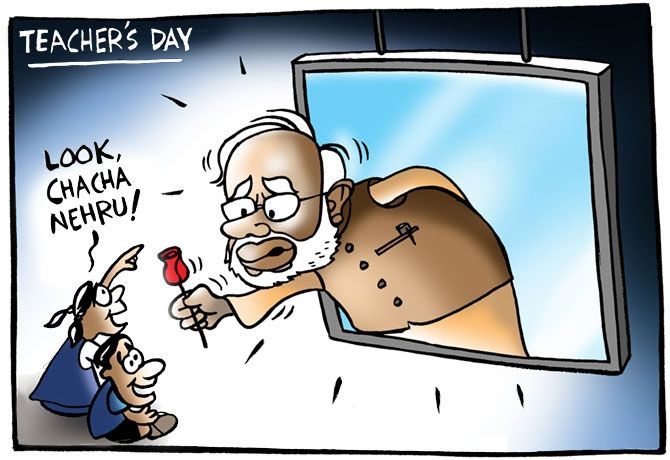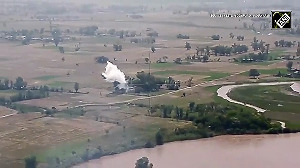'His script, his body language is different, at the most he is a trained pracharak, a national politician building a base, an audience, a community of behaviours and followers from a younger generation, attempting to talk to children so they become his enthusiasts. Many are and that is his victory,' says Shiv Visvanathan.
Illustration: Uttam Ghosh/Rediff.com

Symbolism is an unforgiving discipline. It has a force of its own, it loves the copy as a challenge but hates the imitator. It understands mimicry not just as an act of play and aesthetics, but as a part of drama of survival.
Politics too engages in symbolism and symbols are crucial in maintaining and economising power. Hitler, Churchill, Gandhi, Tilak, Kennedy were masters in the use of the symbols.
Narendra Modi, as Advani said, is a great event manager but the question still remains, is he a great symbolist?
True, he manages crowds, his presence is larger than life size, but the question hangs on his symbolic competence. Critical to this debate is his recent attempt to play Chacha Nehru.
Jawaharlal Nehru was a benign personality, an aristocrat, an icon, a moral figure, who belonged to a history long before he joined politics.
Modi has no equivalent genealogy. He sees and behaves as a construct. The media's attempt to see him as Chacha Nehru is dubious. One can understand the need to create a short-cut continuity, it is smart but like most smartness wears thin quickly.
Yet the equation of Modi as Chacha Nehru has value in a telegraphic sense. Firstly, it locates him closer to Nehru than to Vajpayee. Secondly, it signals a need to see him holistically, as a leader, more as a symbol of a nation than a party.
This conveys a man seeking to alter his body, disengage from an aggressive protest style to something mellow, even avuncular. Chacha conveys that sense of autonomy, wisdom, affection, a sense of ease, an ability to communicate.
It retains authority but removes him from the immediacy of news and locates him in folklore which has a larger shelf life.
If Gandhi was father of the nation and Nehru the chacha, one has to ask what is Modi. A new label will not do. It cannot summon memories, it cannot be a brand, it has to evoke the folk and the mythic imagination of India.
Modi's media men think he could be Chacha Modi. It is a tempting proposition. Nehru belongs to an older generation of memory. The Congress is no longer the party it was. A Sonia or Rahul evoke brickbats or contempt. Chachaji is easily approachable and the temptation is strong to play Chachaji for a new generation looking for avuncular heroes.
The script offered is brilliant, a mix of proverbs, memories, wisdom, jokes, self-depreciating statements, a touch of the Zen or Confucian master imparting wisdom. The stern pracharak overdoing discipline has to dissolve, mellow down into a gentler, more accessible figure, dispensing advice, wisdom, keeping the students engaged.
It is a controlled performance, where jokes get regulated pipette like. In fact, the body language fails him. He does not lose control. He knows he is performing and is self-conscious about it. It adds a little 'iffiness' to the project.
Modi is good, but does not quite have an affable, vintage quality. It is a super performance which needs a fair assessment. Modi's speech was low key, a collage of bits and pieces from earlier performance, invoking a quick nostalgia. But as he settles down for a discussion, he realises that it is students who are the performers, and that all he has to do is regale them with bits of advice, anecdotes. He turns impresario.
He evoked his own childhood, asked students who felt they could be PMs to get ready for the 2024 election. He was pithy with proverbs, full of little scrubbed cliches of dos and don'ts. Yet he was not just a jovial uncle playing village voice, but a contemporary talking Google Guru and lauding the digital world.
His bits of advice was like a do it yourself list of what you can do for your school, your nation, for society, a touch of ethics and a dab of ecology.
Yet all the advice added up to a policy document, a theory of change, a set of attitudes required for change. As advice flows, laced with recollection, anecdote and jokes, one realises that it is not Nehru that he reminds us of.
Nehru was more pedantic, academic. This array of messages was invoking Benjamin Franklin, not Franklin the scientist but Franklin of the Poor Richards Almanac, the Franklin immortalised in 'Early to bed, early to rise, makes a man healthy, wealthy and wise.' He evokes the Franklin, whom the sociologist Max Weber talks about in his The Protestant Ethic and the Spirit of Capitalism.
Modi suggests a similar civics, a Modiji and the new spirit of Nationalism. It is a more Swadeshi lingo, little nuggets of wisdom, bit scenario, bit technique, about how India can be a great country and childhood an enjoyable, truthful stage in ones life.
He is a modernist and a nationalist, different in style from Nehru or Gandhi. Imitation does not suit him. He is a different creation. He is not Chacha Nehru, or Chacha Modi, or Chacha Chaudhary but Mr Modi. His script, his body language is different, at the most he is a trained pracharak, a national politician building a base, an audience, a community of behaviours and followers from a younger generation, attempting to talk to children so they become his enthusiasts.
Many are and that is his victory. He talks of not destroying childhood, of being proud of the nation. He sounds like a swadeshi sage emitting Confucian wisdom, a trifle technocratic, a bit managerial, something out of a profound Careers and Courses magazine issue, contemporary enough to be easily identified with.
That 1.2 billion listened is gratifying enough and many would tell their children why this day was special. That much should be enough for any national leader. One does not need the media to strain for more effect.











